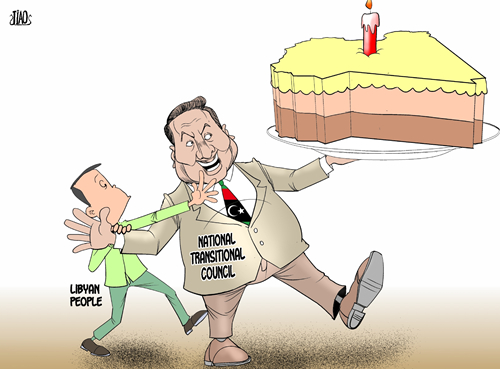[fblike]
 For the last six months Thailand has been in the midst of a political crisis. Two weeks ago on May 7, Thailand’s Constitutional Court ordered the removal of Yingluck Shinawatra as the nation’s prime minister. Shinawatra’s supporters, who also followed her brother Thaksin, a telecommunications billionaire that served as the nation’s leader from 2001-2006, are rural and poor. Middle-class and professional Thais look down on Shinawatra’s supporters and believe that Thailand’s political system is rigged against them. As a result, they have taken to the streets against the Shinawatras and the remaining members of the existing government, choosing to go outside of normal political channels and undermine existing political institutions. The current environment is causing analysts to worry that political tensions could produce a civil war or, at the very least, drag the Thai economy into recession.
For the last six months Thailand has been in the midst of a political crisis. Two weeks ago on May 7, Thailand’s Constitutional Court ordered the removal of Yingluck Shinawatra as the nation’s prime minister. Shinawatra’s supporters, who also followed her brother Thaksin, a telecommunications billionaire that served as the nation’s leader from 2001-2006, are rural and poor. Middle-class and professional Thais look down on Shinawatra’s supporters and believe that Thailand’s political system is rigged against them. As a result, they have taken to the streets against the Shinawatras and the remaining members of the existing government, choosing to go outside of normal political channels and undermine existing political institutions. The current environment is causing analysts to worry that political tensions could produce a civil war or, at the very least, drag the Thai economy into recession.
This topic brief will give an overview of Thailand’s political problems, analyze the current political stalemate, and highlight scenarios that extempers should consider for speeches as the Thai political crisis deepens.
Readers are also encouraged to use the links below and in the related R&D to bolster their files about this topic.





 The citizens of South Sudan, the world’s youngest country, have had their daily lives disrupted by a civil war since December. The war, waged between two political factions that break along ethnic lines, has escalated in recent months and brought back memories of the Rwandan genocide of 1994. The war threatens the country’s oil-based economy, the stability of central Africa, and risks creating a humanitarian disaster. Since South Sudan won its independence through a civil war that lasted more than two decades, it is tragic that it has become the most recent global victim of civil unrest and the international community is struggling to contain the violence and provide assistance to people in need. Due to the fact that the situation in South Sudan is more likely to get worse over the coming months, extempers should be prepared to talk about South Sudan’s woes as they are likely to headline any African or international organizations round.
The citizens of South Sudan, the world’s youngest country, have had their daily lives disrupted by a civil war since December. The war, waged between two political factions that break along ethnic lines, has escalated in recent months and brought back memories of the Rwandan genocide of 1994. The war threatens the country’s oil-based economy, the stability of central Africa, and risks creating a humanitarian disaster. Since South Sudan won its independence through a civil war that lasted more than two decades, it is tragic that it has become the most recent global victim of civil unrest and the international community is struggling to contain the violence and provide assistance to people in need. Due to the fact that the situation in South Sudan is more likely to get worse over the coming months, extempers should be prepared to talk about South Sudan’s woes as they are likely to headline any African or international organizations round. Last week, Nigeria announced the results of the rebasing (changing the weights given to different sectors of its economy) of its Gross Domestic Product (GDP). International observers expected the rebasing, which had not taken place since 1990, to add significant value to the nation’s economy, but they did not anticipate that it would add 89% to Nigeria’s existing GDP and make it Africa’s largest economy. The rebasing suggests that the Nigerian economy is worth $510 billion versus $370 billion for South Africa, who had long held the title of Africa’s largest economy. However, although the GDP figures suggest that Nigeria is a nation on the rise, the country confronts a domestic Islamist insurrection, corruption problems, and rampant poverty. Fixing these problems will be important if Nigeria wants to become a leading power on the African continent and an influential international player.
Last week, Nigeria announced the results of the rebasing (changing the weights given to different sectors of its economy) of its Gross Domestic Product (GDP). International observers expected the rebasing, which had not taken place since 1990, to add significant value to the nation’s economy, but they did not anticipate that it would add 89% to Nigeria’s existing GDP and make it Africa’s largest economy. The rebasing suggests that the Nigerian economy is worth $510 billion versus $370 billion for South Africa, who had long held the title of Africa’s largest economy. However, although the GDP figures suggest that Nigeria is a nation on the rise, the country confronts a domestic Islamist insurrection, corruption problems, and rampant poverty. Fixing these problems will be important if Nigeria wants to become a leading power on the African continent and an influential international player. The “Arab Spring” of December 2010 created uprisings throughout the Middle East and North Africa and successfully brought down the existing governments of Tunisia, Egypt, and Libya. As extempers are aware, the Arab Spring, which has also been referred to as the “Arab Uprisings” by some Middle Eastern historians like Dr. Juan Romero of Western Kentucky University, has not produced more stability in the region and some countries that were affected are sliding back toward despotism. Egypt has a short-lived post-revolutionary government under the Muslim Brotherhood that was deposed by the Egyptian military in the fall of last year and Libya is struggling to regain its footing after deposing long time dictator Muammar Gaddafi (you will also see Gaddafi referred to in the media as “Qaddafi”). Libya is home to feuding tribal groups and militias, some of whom have seized the country’s ports and prevented oil from leaving the country. In some ways, Libya’s problems mirror those of Iraq after the United States invasion in 2003 where the central government, built around the personality of the main leader, collapsed and the interim government is finding it very difficult to piece the nation back together again. A big difference between the two is that the United States and its allies in the North Atlantic Treaty Organization (NATO) never officially put “boots on the ground” in Libya, so the interim government there has struggled to maintain order.
The “Arab Spring” of December 2010 created uprisings throughout the Middle East and North Africa and successfully brought down the existing governments of Tunisia, Egypt, and Libya. As extempers are aware, the Arab Spring, which has also been referred to as the “Arab Uprisings” by some Middle Eastern historians like Dr. Juan Romero of Western Kentucky University, has not produced more stability in the region and some countries that were affected are sliding back toward despotism. Egypt has a short-lived post-revolutionary government under the Muslim Brotherhood that was deposed by the Egyptian military in the fall of last year and Libya is struggling to regain its footing after deposing long time dictator Muammar Gaddafi (you will also see Gaddafi referred to in the media as “Qaddafi”). Libya is home to feuding tribal groups and militias, some of whom have seized the country’s ports and prevented oil from leaving the country. In some ways, Libya’s problems mirror those of Iraq after the United States invasion in 2003 where the central government, built around the personality of the main leader, collapsed and the interim government is finding it very difficult to piece the nation back together again. A big difference between the two is that the United States and its allies in the North Atlantic Treaty Organization (NATO) never officially put “boots on the ground” in Libya, so the interim government there has struggled to maintain order.  Prior to the First World War in 1914, Argentina’s economy was considered one of the top ten in the world. Following the war, which disrupted the country’s economic advantages in trade, the country has experienced political upheaval, corruption, and pursued poor economic policies that have eroded what was once a beacon of wealth in Latin America. In 2002, the nation experienced the largest sovereign debt default in history and twelve years later some economists are fearing that it is heading down the same road. President Cristina Fernandez de Kirchner, who took power in 2007, has enacted populist economic reforms while attempting to consolidate her rule. However, these policies have eroded foreign investment, sparked high inflation, and are now beginning to create political unrest that threatens her hold on power. Extempers who read our brief earlier this season on Venezuela’s municipal elections will find some similarities between its economy and Argentina and this brief should be a useful tool for extempers that have to talk about the Argentinean economy or the rise and fall of populist and leftist policies in Latin America.
Prior to the First World War in 1914, Argentina’s economy was considered one of the top ten in the world. Following the war, which disrupted the country’s economic advantages in trade, the country has experienced political upheaval, corruption, and pursued poor economic policies that have eroded what was once a beacon of wealth in Latin America. In 2002, the nation experienced the largest sovereign debt default in history and twelve years later some economists are fearing that it is heading down the same road. President Cristina Fernandez de Kirchner, who took power in 2007, has enacted populist economic reforms while attempting to consolidate her rule. However, these policies have eroded foreign investment, sparked high inflation, and are now beginning to create political unrest that threatens her hold on power. Extempers who read our brief earlier this season on Venezuela’s municipal elections will find some similarities between its economy and Argentina and this brief should be a useful tool for extempers that have to talk about the Argentinean economy or the rise and fall of populist and leftist policies in Latin America.